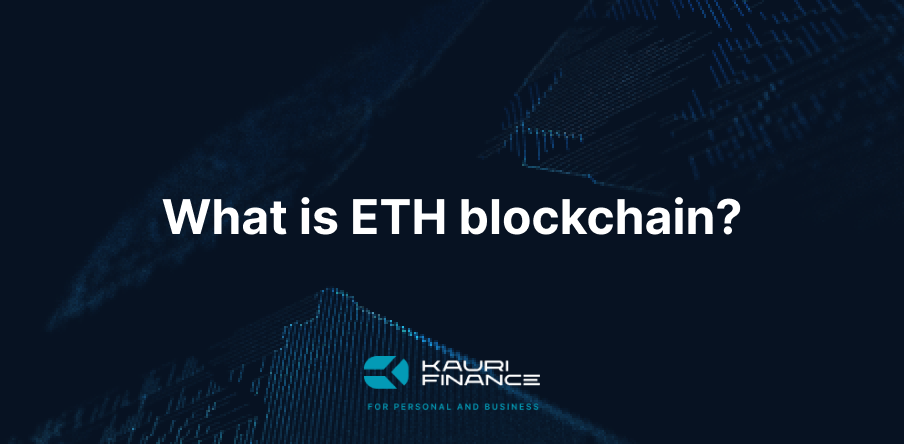
What is Ethereum on the Blockchain?
- What is Ethereum on the Blockchain?
- Is ETH a Coin or Token?
- What Is Ethereum? How Does It Work?
- Smart Contracts
- Decentralized Applications (dApps)
- Ethereum Virtual Machine (EVM)
- What is Ethereum Blockchain vs Bitcoin Blockchain?
- Purpose and Functionality
- Consensus Mechanism
- Transaction Speed and Costs
- Ethereum Benefits
- Flexibility and Scalability
- Decentralization and Security
- Interoperability
- How To Buy Ethereum
- 1. Choosing an Exchange
- 2. Creating an Account
- 3. Funding Your Account
- 4. Placing an Order
- 5. Storing ETH Safely
- What Makes Ethereum Unique?
- Smart Contract Capability
- Robust Developer Community
- Constant Evolution
- The Potential of Ethereum
- DeFi Expansion
- NFT Boom
- Enterprise Adoption
- How To Choose an Ethereum Wallet
- Types of Wallets
- Recommended Wallet: KAURI Crypto Wallet

What is Ethereum on the Blockchain?
Ethereum is an open-source, decentralized blockchain platform that allows developers to build and deploy smart contracts and dApps. It was proposed by Vitalik Buterin in late 2013 and development was crowdfunded in 2014. The network went live on July 30, 2015. Unlike Bitcoin, which primarily functions as a digital currency, Ethereum is designed to be a versatile platform for executing programmable transactions and applications without downtime, fraud, or third-party interference.
Ethereum’s native cryptocurrency, Ether (ETH), is used to power the network, pay for transaction fees, and incentivize participants. The platform’s unique ability to execute code of any algorithmic complexity, known as Turing-completeness, makes it a robust tool for a wide range of applications, from financial services to supply chain management.
Is ETH a Coin or Token?
Ether (ETH) is the native cryptocurrency of the Ethereum blockchain. It functions similarly to Bitcoin in that it can be used for transactions and as a store of value. In this context, ETH is considered a coin because it is the primary medium of exchange within the Ethereum ecosystem.
In addition to ETH, the Ethereum platform supports a variety of tokens, which can be created and managed using Ethereum's standards such as ERC-20 and ERC-721. These tokens are used in various dApps and can represent assets, utility functions, or even ownership rights. They are often referred to as tokens because they are created on the Ethereum platform and do not operate as independent currencies.
What Is Ethereum? How Does It Work?
Smart Contracts
Ethereum introduced the concept of smart contracts, which are self-executing contracts with the terms of the agreement directly written into code. These contracts automatically enforce and execute transactions once predefined conditions are met, without the need for intermediaries. This innovation allows for a wide range of applications, from simple transactions to complex financial instruments.
Decentralized Applications (dApps)
Ethereum supports the development and deployment of dApps, which run on a decentralized network of computers rather than a single server. These applications leverage Ethereum’s blockchain to ensure transparency, security, and resilience. dApps can range from financial services and gaming to social media and supply chain management.
Ethereum Virtual Machine (EVM)
The Ethereum Virtual Machine (EVM) is the runtime environment for smart contracts on Ethereum. It is a Turing-complete virtual machine that allows developers to write code that runs on the Ethereum blockchain. The EVM executes the logic of smart contracts and ensures that the network operates in a secure and deterministic manner.
What is Ethereum Blockchain vs Bitcoin Blockchain?
Purpose and Functionality
- Bitcoin: Designed primarily as a digital currency and a store of value, Bitcoin focuses on secure, peer-to-peer transactions without intermediaries. Its blockchain is optimized for this function, ensuring security and immutability.
- Ethereum: While it also functions as a digital currency, Ethereum’s primary purpose is to serve as a platform for building and running decentralized applications. Its blockchain is more versatile, allowing for complex programming through smart contracts.
Consensus Mechanism
- Bitcoin: Uses Proof of Work (PoW), which involves miners solving complex mathematical problems to validate transactions and create new blocks. This process is resource-intensive and has been criticized for its environmental impact.
- Ethereum: Initially used PoW but transitioned to Proof of Stake (PoS) with the Ethereum 2.0 upgrade. In PoS, validators are chosen to create new blocks and confirm transactions based on the amount of ETH they hold and are willing to "stake" as collateral. This system is more energy-efficient and scalable compared to PoW.
Transaction Speed and Costs
- Bitcoin: Transactions on the Bitcoin network can be slower and more expensive, especially during periods of high demand.
- Ethereum: Generally offers faster transaction times and lower costs, making it more suitable for applications that require quick and affordable transactions.
Ethereum Benefits
Flexibility and Scalability
Ethereum’s platform supports a wide range of applications beyond digital currency. Its ability to execute smart contracts and host dApps provides developers with the flexibility to create innovative solutions in various sectors, including finance, healthcare, and logistics.
Decentralization and Security
Ethereum operates on a decentralized network of nodes, ensuring that no single entity has control over the platform. This decentralization enhances security, making it resistant to censorship and fraud.
Interoperability
Ethereum’s compatibility with various standards (such as ERC-20 for fungible tokens and ERC-721 for non-fungible tokens) promotes interoperability within the blockchain ecosystem. This allows for seamless integration and interaction between different dApps and tokens.
How To Buy Ethereum
1. Choosing an Exchange
To buy ETH, you need to choose a cryptocurrency exchange. Popular exchanges like Coinbase, Binance, and Kraken offer ETH trading pairs. It's important to select a reputable exchange that provides strong security measures and user-friendly interfaces.
2. Creating an Account
Create an account on your chosen exchange by providing necessary identification and verification documents. This process varies by exchange but typically involves submitting proof of identity and residency.
3. Funding Your Account
Deposit funds into your exchange account using a bank transfer, credit card, or other supported methods. Some exchanges also allow you to purchase ETH directly using fiat currencies.
4. Placing an Order
Navigate to the ETH trading pair on your exchange and place an order to buy ETH. You can choose between market orders (buying at the current market price) or limit orders (buying at a specific price).
5. Storing ETH Safely
After purchasing ETH, transfer it to a secure wallet. Leaving your ETH on an exchange can expose you to security risks, so using a private wallet is recommended for long-term storage.
What Makes Ethereum Unique?
Smart Contract Capability
Ethereum’s support for smart contracts sets it apart from many other blockchains. These self-executing contracts enable a wide range of automated processes and transactions, paving the way for innovative applications and business models.
Robust Developer Community
Ethereum has a large and active developer community that contributes to its ecosystem through continuous development, security improvements, and innovation. This community support has led to the creation of numerous tools, frameworks, and applications that enhance the platform’s functionality.
Constant Evolution
Ethereum’s continuous evolution and upgrades, including the transition to Ethereum 2.0, demonstrate its commitment to improving scalability, security, and sustainability. These upgrades ensure that Ethereum remains a leading platform in the blockchain space.
The Potential of Ethereum
DeFi Expansion
Ethereum is at the forefront of the decentralized finance (DeFi) revolution. Its platform supports various DeFi applications, including decentralized exchanges, lending platforms, and yield farming. The growing DeFi ecosystem on Ethereum has the potential to disrupt traditional financial systems and create new opportunities for financial inclusion.
NFT Boom
The rise of non-fungible tokens (NFTs) has further highlighted Ethereum’s versatility. NFTs, which are unique digital assets, are often created and traded on the Ethereum blockchain. This trend has opened up new possibilities for digital art, collectibles, and gaming.
Enterprise Adoption
Ethereum’s capabilities extend to enterprise solutions. Many businesses and organizations are exploring Ethereum-based applications for supply chain management, identity verification, and more. The platform’s ability to support complex smart contracts and dApps makes it a valuable tool for enterprise use cases.
How To Choose an Ethereum Wallet
Types of Wallets
When choosing an Ethereum wallet, consider the different types available:
- Hardware Wallets: Physical devices that store your private keys offline. Examples include Ledger and Trezor. They offer high security but can be less convenient for frequent transactions.
- Software Wallets: Applications installed on your computer or mobile device. They provide a balance between security and convenience. Examples include MetaMask and MyEtherWallet.
- Web Wallets: Online wallets that can be accessed through a web browser. While convenient, they are generally less secure than hardware and software wallets.
- Paper Wallets: Physical printouts of your private keys and public addresses. These are highly secure if kept offline but can be impractical for regular use.
Recommended Wallet: KAURI Crypto Wallet
For those seeking a secure and user-friendly Ethereum wallet, the KAURI Crypto Wallet is an excellent choice. It supports Ethereum and multiple other chains, offering robust security features to protect your assets. The wallet is designed to provide a seamless experience for managing ETH and interacting with dApps on the Ethereum network.
This article provides a detailed overview of Ethereum, its blockchain, and its potential. By understanding Ethereum's unique features and capabilities, individuals can better appreciate its role in the blockchain ecosystem and make informed decisions about engaging with this revolutionary platform.
